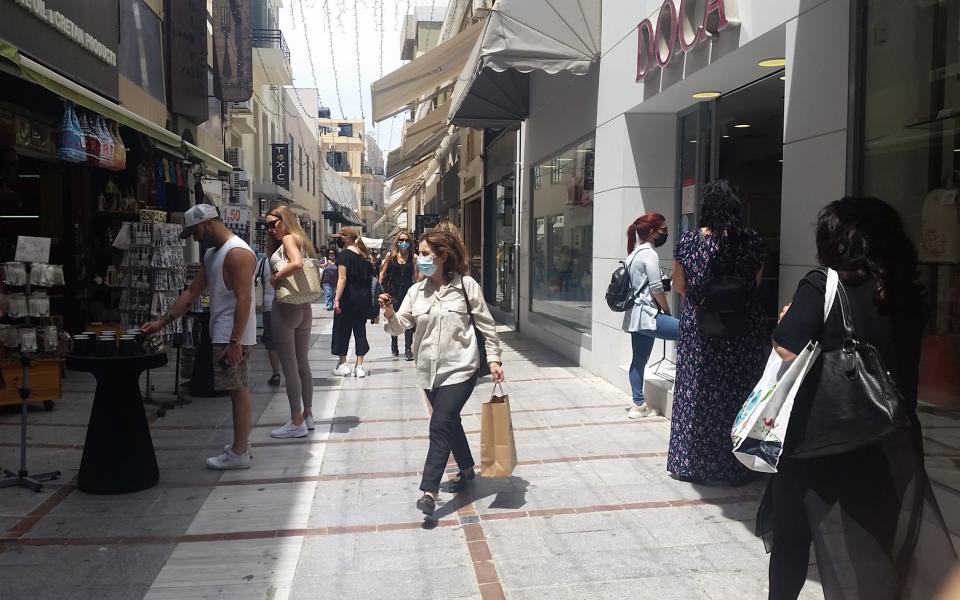'It will not be an easy season for us here in Crete': Tourism reboot begins in Greece

After six months in lockdown, Greece’s long-awaited tourism reboot in the Cretan capital of Heraklion was a bit of a non-event.
At 11am on May 14, despite temperatures of 27°C in the shade, the museums were empty, many shops were shuttered and only pigeons strutted along streets that had bustled with life pre-Covid.
“It’s not just that there are no tourists, its Greeks, too, who are missing – they have no money,” said Evgenia Chasapidou, manager of Capsis Astoria, one of the few city hotels that stayed open during lockdown. “I think it will not be an easy season for us here in Crete. So far all the bookings are last minute. People all want to be vaccinated before travel – to feel safe.”
In the race to win British tourists back to the Mediterranean, Greece was doing well and then lockdown fatigue set in and cases spiked. “People became careless, especially younger people – they wanted to go out; to have fun,” said the hotel’s restaurant manager, Giorgos Terizakis.
With the country currently recording around 2,000-3,000 new cases per day, Greece has also been hampered by the slow vaccine rollout – as of today’s date only 1.4 million people, around 13 per cent of the population –have received both shots.

In a desperate bid to reassure travellers that Greece is a safe destination, Prime Minister Kyriakos Mitsotakis has launched Operation Blue Freedom, a campaign which aims to vaccinate all of the country’s islands – including the popular resorts of Crete, Rhode, Corfu and Santorini – by early June.
“I want to send the clear message: Greece is open again,” he told journalists.
Despite deferred VAT payments, subsidies and loan repayment relief, however, businesses in Crete – and elsewhere in Greece – are hampered by huge overheads, including electricity bills, which are the second most expensive in Europe according to a recent European Commission's Directorate report.
“I have apartments in the seaside resort of Agia Pelagia and my clientele is nearly 80 per cent British – this is killing me,” said Leonidas Aretakis, 42, who also owns The Home, a boho bistro near Heraklion’s Lion’s Square.
“As for this restaurant, I only opened it a year ago and it’s been closed for the past eight months. Now I’m open, but although I have 34 tables I can only serve to the seven that are out in the courtyard. I’ll still have to pay all the bills, though – it’s very difficult.”

With a population of around 650,000 and more than a third employed in the tourist industry, Crete’s seasonal workers are desperate to return to work. “We have not had so many cases here in Crete - maybe around 4,000 - and yet everything has been closed for so long,” said Maria Papadopoulos.
“We have not had bars, taverns, schools or any kind of nightlife for six months and we’ve had curfew at 9pm – and sometimes 6pm. Of course I need the money badly, but also I’m so tired of staying inside and not seeing anyone. I just want to go back to work. I want to go back to normal – whatever the risk”.
In a further blow for the country’s tourist industry, Greece and its islands will be on the UK’s amber list from May 17, which means that Britons will have to self-isolate on their return home.
“For the moment we live from day to day, but for July and August about 20 per cent of our reservations are from British clients. Despite everything I think people are not so scared to come to Greece. I think most people see Greece – and more particularly Crete – as a safe destination,” Ms Chasapidou said.
As night descends over the city where Zorba The Greek author Nikos Kazantzakis, was born, the streets that have been deserted all day long are suddenly packed with street vendors hawking sweetcorn, families eating ice-cream and buskers serenading long lines of shoppers queuing to buy the new clothes that they’ll finally have a reason to wear.

“Tonight I don’t think we really care much about tourists coming or not. Tonight is the first time in six months we can leave our homes without sending an SMS. You could say we are fiddling while Rome burns, but for tonight we want to forget,” said Giorgos Terizakis.
“For the last month we have only been able to travel two kilometres from our homes and only with a text message. Six-month lockdown was impossible. We cannot do this ever again.”


